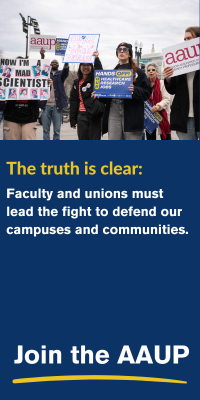- About
- Programs
- Issues
- Academic Freedom
- Political Attacks on Higher Education
- Resources on Collective Bargaining
- Shared Governance
- Campus Protests
- Faculty Compensation
- Racial Justice
- Diversity in Higher Ed
- Financial Crisis
- Privatization and OPMs
- Contingent Faculty Positions
- Tenure
- Workplace Issues
- Gender and Sexuality in Higher Ed
- Targeted Harassment
- Intellectual Property & Copyright
- Civility
- The Family and Medical Leave Act
- Pregnancy in the Academy
- Publications
- Data
- News
- Membership
- Chapters
Legal Watch: The Status of Graduate Assistant Organizing
Collective bargaining by graduate students who work as teaching or research assistants at private universities is a contentious issue. The National Labor Relations Board (NLRB) has reversed its position on this issue several times over the past two decades. In 2000, the NLRB found in its New York University decision that graduate assistants at private universities had the right to unionize. But in 2004, the NLRB overturned that decision in Brown University, determining that graduate assistants were not employees. Then, in its 2016 Columbia University decision, the board, largely appointed by President Obama, overruled Brown. In reaching this decision, the board found that granting collective bargaining rights to graduate assistants promotes academic freedom and, citing an AAUP amicus brief, that it would not harm the ability of universities to function. The board also relied on the AAUP’s amicus brief when it found that the duties of graduate assistants constituted work for the university and were not primarily educational.
Graduate student activists expected that the Republican majority that subsequently took control of the board would seek an opportunity to overturn the Columbia University ruling. They were correct. In September 2019, the NLRB issued a notice of proposed rulemaking (NPRM) that proposes adopting a rule that any students who are also teaching or research assistants at private colleges or universities are not “employees” under the National Labor Relations Act (NLRA). Rulemaking is a categorical approach to statutory interpretation, as opposed to the adjudication process that creates legal precedents such as Columbia University.
The AAUP has a long history of support for the unionization of graduate assistants and again included its voice by submitting comments in response to the NPRM, arguing that the proposed rule should be rejected and that the current precedent of Columbia University should stand. The AAUP’s comments—which were drafted by Risa L. Lieberwitz and Rana M. Jaleel, assistant professor of gender, sexuality, and women’s studies at the University of California, Davis—clearly demonstrate that the law, policy, and empirical evidence support the board’s finding in Columbia University that graduate assistants are subject to the protections of the NLRA.
The NPRM is flawed in many respects. It asserts that potential harm to an institution’s academic freedom is a basis for excluding graduate assistants from collective bargaining. The AAUP’s comments refute this assertion and argue that “collective bargaining by faculty and graduate assistants is one of several ways to promote academic freedom on campus, as it allows faculty, students, and administrators to discuss collectively how best to do their shared work of teaching and research.” The NPRM also presents a narrow view of the scope of academic freedom. The AAUP has long recognized that graduate assistants as well as faculty members are entitled to academic freedom. As the comments note, “The full scope of academic freedom includes individual academic freedom of those who work for the university by engaging in teaching and research—that is, faculty and graduate assistants. Indeed, the educational mission of the university depends on respecting the individual academic freedom of faculty and graduate assistants.” Further, the AAUP “promotes collective bargaining to reinforce the best features of higher education,” as our Statement on Collective Bargaining asserts, including “to protect academic freedom.”
Finally, the NPRM excludes graduate assistants, as a class, from employee status under the NLRA by claiming that they are “primarily students.” This assertion is legally inaccurate. Both the law and policy leave no doubt that the term employee is broadly defined and includes work performed by graduate assistants. As the AAUP’s comments observe, this proposed exclusion is inconsistent with common law, Supreme Court precedent, and the purposes of the NLRA to encourage collective bargaining. In its Columbia University decision, the board stated, “The unequivocal policy of the Act . . . is to ‘encourag[e] the practice and procedure of collective bargaining’ and to ‘protect[] the exercise by workers of full freedom of association, self-organization, and designation of representatives of their own choosing.’ Given this policy, coupled with the very broad statutory definitions of both ‘employee’ and ‘employer,’ it is appropriate to extend statutory coverage to students working for universities covered by the Act unless there are strong reasons not to do so.” That reasoning still holds true.
The NLRB will need to respond to the comments submitted, and we will keep AAUP members apprised of any rulemaking.
Risa L. Lieberwitz is professor of labor and employment law at Cornell University and general counsel of the AAUP, and Nancy Long is associate counsel at the AAUP.



